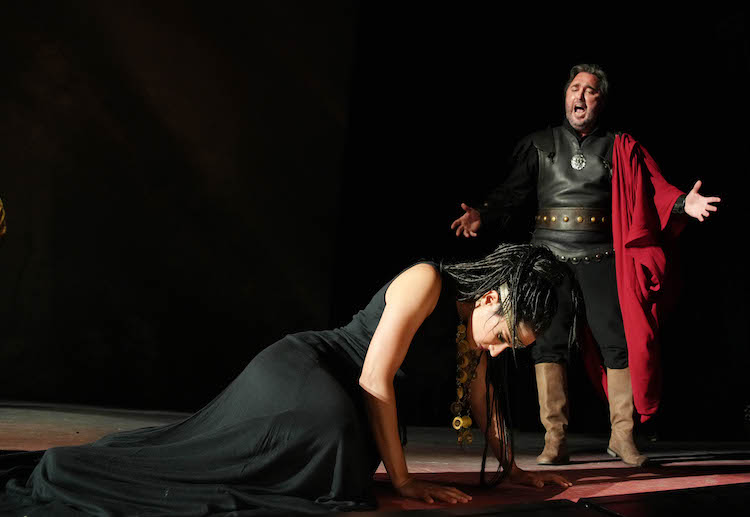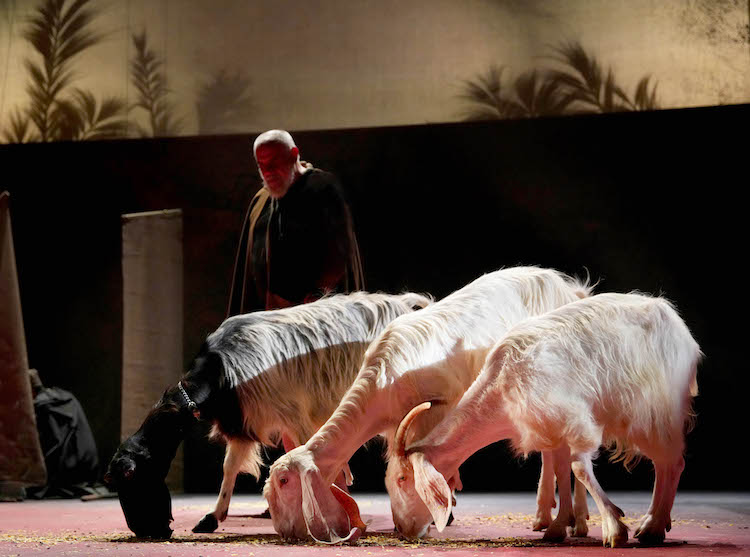The year is 1813, Rossini is 22 years old. He has had two huge successes in Venice — L’italiana in Algeri, his first big comedy (there were seven smaller ones before), and Tancredi, his first big serious opera (there was two previous smaller ones). But on December 26 his next opera seria, Aureliano in Palmira was a flop at La Scala. [These are reminders for Rossinians.]
The libretto of Aureliano in Palmira is by La Scala’s librettist Felice Romani. This prolific librettist provided the librettos for all three Rossini La Scala commissions [the other two are Il Turco in Italia (1814) and Bianca e Falliero (1819)]. Romani is best known and appreciated for his many librettos for Donizetti and Bellini.
Most Romani librettos were set by multiple composers, though the three Rossini librettos were set only by Rossini. The turco in Italia libretto is dramatically quite complex. The libretto for Aureliano in Palmira is no less complicated, compacting three or more major battles and their motivations and aftermath into two confusing acts.
The Aureliano in Palmira libretto was famously the cause of the failure of the opera. Romani felt the need to defend his work, saying that he was never “discostato un momento dal verosimile” meaning that his story at least always seemed real, or that it could have been real. It was up to Rossini, then, to make it real. The contemporary perception was that he did not, the fault of the singers, said Rossini. But it was a big job — they had to deal with the undying love of the Prince of Persia and the Queen of Syria (lead photo is Raffaella Lupinacci as the Prince and Sara Blanch as the Queen) thwarted again and again by the might of the Roman Empire led by the Emperor Aureliano who lusted relentlessly after the Syrian Queen while never wavering from his military objectives.
It is hard to fault the quality of the music of Aureliano in Palmira because Rossini simply recycled much of it two years later into Il barbiere di Siviglia which was a flop too. But only at first. So Rossini was right, there was nothing wrong with the music.
In 2014 the Rossini Festival entrusted the production of this sprawling opera to director Mario Martone who couldn’t quite fit it onto the stage of the festival’s small, 19th century Teatro Rossini, clumsily spilling a Roman column and a throne out over the orchestra pit. Gratuitously some entrances onto the stage were made through from the audience, plus the chorus was often spread out onto the stage apron and left there, exceeding the boundaries of imagination imposed by the proscenium.
The clumsy staging was compounded by academic conducting, a tenor who did not have Aureliano’s high notes, a soprano who preferred to be a statue, the pants role sung by a mezzo who would have preferred to be somewhere else.
Not having greatly appreciated the performance in 2014, I looked forward to this re-mounting with some trepidation.
But just now Rossini’s second major attempt at opera seria was soundly vindicated! Greek conductor George Petrou, a Baroque specialist, illuminated intense periods of amorous passion, passionate rejection, heart breaking sorrow, vivid denunciation, etc. He securely directed the opera towards a more mature Rossinian opera seria style, though the opera still lacks the magnificent finales of the later Neapolitan tragedies, Rossini contenting himself here with a final trio and chorus (though stage director Martoni did line up his six principals across the front of the stage to make a visual sextet).

The Russian general, tenorino Alexey Tatarintsev, now had ringing high C’s aplenty, regaling us as well with a secure high D in a moment of supreme duress. Though amply able to execute Rossini’s complicated ornamental lines he never lost the heroic focus of voice for a Roman general.
Young Spanish soprano Sara Blanch brought tireless, full tone voice to a beautifully enacted Zenobia, Queen of Syria. Young Italian mezzo Raffaella Lupinacci brought fresh mezzo sound to the pants role Arsace, prince of Persia, the two singers creating gorgeous declarations of love, and glorious declarations of fulfillment as only Rossini can conceive and vocally decorate.
The Teatro Rossini is closed for the repair of earthquake damage, thus the production was enlarged to fill the far larger Arena Vitrifrigo theater. Though now missing the Roman artifacts there were still the same filmy panels of various sizes that flew in and out to make mazes, tents, battlefields, palaces, and mountains. Plus there was again an elevated walkway hidden behind the brown backdrop that from time to time revealed soldiers, refugees, etc., trudging to and fro. That was it.

Except for the three live goats that wandered onto the stage during a lovely chorus (though Syria may have been in flames its peasants were rejoicing in the freedom of their fields) — there had been four goats in the much smaller Teatro Rossini.
While Pesaro’s Orchestra Sinfonica G. Rossini and Fano’s Coro del Teatro Della Fortuna (Fano is a small town a few kilometers south of Pesaro) have well served productions in the small Teatro Rossini, neither ensemble has sufficient presence to inhabit the much larger space of the Vitrifrigo Arena theater.
Michael Milenski
All photos copyright Amati Bacciardi, courtesy of the Rossini Opera Festival